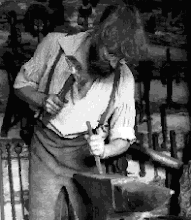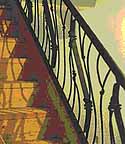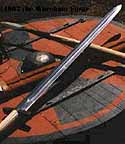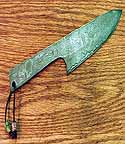I was wondering if I could relay a story you once told me to a class I am teaching next week. This semester I am teaching Industrial Archaeology in Tromsø and in one of the first lectures I pose the question of when does a cottage industry start and an industrial operation begin. If I remember correctly, you once told me a story about legislation of concerning blacksmiths in Ontario. Basically - blacksmith shops are classified as industrial operations like metal foundries or factories and there would be no way you could easily have a blacksmith shop in Toronto, or anywhere else unless you had neighbours who were cool with it. Am I correct in that recollection of your story?
So - this is the situation as I understand it - almost all of this a refection of experiences that people I know have endured at some point.
Inside urban areas, if you actually attempted to 'officially' open a blacksmith's shop, there are a number of major problems you would have to deal with.
Zoning Bylaws is one.
Because blacksmithing obviously pre-dates most of these kind of laws, and when current laws were drafted, blacksmithing had already all but disapeared, modern classifitactions just don’t easily apply. As with so much related to ‘Building Code’ or ‘Zoning’ - the whim of the individual inspector becomes more important than a realistic assessment. I have been told that the most likely outcome will be for an inspector to group blacksmithing activities into other high temperature occupations - meaning * foundry * work. This would mean assessing as * heavy industrial *. Obvious there are severe limitations on where heavy industrial work can be carried out. (Most certainly not in a residential neighbourhood back garage!)
I have heard that some people have managed to get the activity of blacksmithing described as ‘artistic work’ and at least get around the first level problem of Zoning restrictions
A second potential problem (that I actually have heard of occurring several times) is the nature of the equipment used.
Coal forges most certainly create smoke. As modern people are almost all completely unfamiliar with the smell of burning coal, complaints are almost certain to occur. If this elaborates to involving the Ministry of Environment, a small scale blacksmith is basically impossible. The cost of the kind of chimney scrubbing units required would prove astronomical.
Propane forges make absolutely no smoke. It is important to remember that a gas forge is specifically designed to contain the operating temperatures for forge work! But it is not possible to purchase a commercial gas forge with a CSA safely approval. Some of the USA suppliers do sell forges with an UL certification. Again it would be up to an individual inspector if they would accept this certification (not all will).
There is a fuzzy line with propane storage. Technically, most insurance policies do not permit any propane cylinder larger than 10 lbs (so small trailer sized, not even standard BBQ tanks) inside a structure. The use time on a 20 lb tank is only several hours (I run with 40 lb cylinders here). There are likely Fire Department into By Law limitations here some where (honestly, I have never researched this!)
A third potential area is ‘home built equipment’. Inspectors * hate * home built equipment. Blacksmiths by the core nature of the trade are tool makers.
Many blacksmiths again work using home built gas forges (a trivial build actually). This almost becomes necessary if you are undertaking ‘general’ work, where the size and shape of the metal requiring heat can vary so much. (Maybe if you just made small knives this would not be such a problem.) More typical is to have a number of different sizes, shapes and designs of forges, often with unique builds made to suit a specific job.
Is there any electrical component to larger powered equipment? High speed sanders, mechanical hammers both being two pieces of middle level (i.e. professional) equipments that commonly are shop built rather than purchased.
How about those large air powered forging tools, air hammers or hydraulic presses (that second becoming much more popular over the last decade)? Most starting level tools of this type are shop builds, although at least have separate commercial air compressors to drive them. The difference in cost is significant - even a small commercial air hammer is going to run at least $10,000 - and even there those Chinese or Turkish machines are questionable in quality - and require modifications in the electric power systems to run on North American 110 V / 60 cycle power. Obviously the home builds have no safety certifications. Neither will the Chinese or Turkish builds.
With the most common workshop being run by a single individual, all these powered tools are more and more involved (as a replacement to what was once was apprentice labour)
The last mess here - a reflection of all of the above, is getting any insurance. Now you could decide to just skip that element. Again, the whim of the inspector comes directly into effect here.
In an urban, sub-urban location, a lot of potential problems will come down to your neighbours. Too often, the joker out cutting his lawn three times a week at 9 pm - will be the one who instantly phones the fire department if you light your forge in the garage. (Yes - this did happen one time to me personally in Toronto, three times in one afternoon.) Even if attempting to stay ‘under the official radar’, you are pretty much throwing the dice.
Anyone I have every heard of who has attempted to secure official permissions to ‘legally’ operate a blacksmith’s shop inside an urban / suburban location has had nothing but a maze of (often conflicting) inspections and restrictions, with huge expenses involved.
Obviously a rural location presents an entirely different situation. Right off the start, with general zoning as ‘agricultural’, most often even officially, blacksmithing is considered a traditional element of farm related work.
Mostly any By Law inspections are ‘complaints driven’ - not the result of roving officials.
The best advice to give anyone thinking of starting up a blacksmithing operation (even as an occasional hobby activity) is ‘Don’t Ask - Don’t Tell’
In case any of you were (really?) wondering why the Wareham Forge is located on a dirt road surrounded by farms in Grey County…
 | |
| Looking at the workshop and residence - from the SE crossroads (2005!) |




















No comments:
Post a Comment